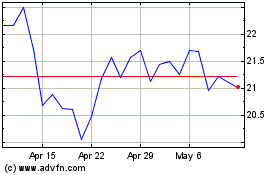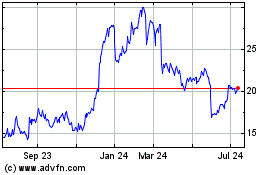T-Mobile Gets Deal Clearance -- WSJ
December 18 2018 - 3:02AM
Dow Jones News
This article is being republished as part of our daily
reproduction of WSJ.com articles that also appeared in the U.S.
print edition of The Wall Street Journal (December 18, 2018).
By Drew FitzGerald and Kate O'Keeffe
T-Mobile US Inc. won approval from U.S. national-security
officials for its planned takeover of Sprint Corp., bringing the
two rivals a step closer to closing their roughly $26 billion
combination.
The Committee on Foreign Investment in the U.S., or Cfius, told
the companies Monday that it had cleared the union of the No. 3 and
No. 4 carriers by subscribers after several months of negotiations
with company representatives, the companies said.
The interagency committee, which is led by the Treasury
Department, reviews foreign deals for potential national security
issues and can recommend the president block transactions if such
concerns aren't resolved. Japanese telecom giant SoftBank Group
Corp. owns most of Sprint, while Germany's Deutsche Telekom AG is a
majority shareholder of T-Mobile in the U.S.
Additionally, Team Telecom, which includes the departments of
Justice, Homeland Security and Defense, confirmed it had no
objections to the merger, the companies said.
The deal still needs approval from antitrust authorities at the
Federal Communications Commission and Justice Department. T-Mobile
executives have said they expect that process to end in the first
half of next year.
The Cfius review took place while a host of other U.S. officials
waged a separate campaign to persuade allies to cut ties with
China's Huawei Technologies Co., which works with Deutsche Telekom
and Softbank abroad. These U.S. officials have cited concerns that
the Chinese telecommunications giant would use its hardware to spy
on foreign networks, which Huawei has denied.
Cfius previously required Sprint to remove Huawei equipment from
its U.S. network as part of a 2013 review triggered by SoftBank's
purchase of a controlling stake in Sprint. Deutsche Telekom went
through a similar process when it entered the U.S. market. But
anything that relates to networks overseas is outside the scope of
the committee's authority.
Neither Deutsche Telekom nor SoftBank is required to
significantly change its own business or operations as a result of
Cfius's demands, according to the terms of the merger. Any
potential changes are limited to T-Mobile, Sprint and their
respective subsidiaries, deal documents show.
Still, the global campaign by the other U.S. national security
officials outside of Cfius was bearing some fruit. Deutsche Telekom
on Friday said it was reviewing its procurement strategy for vendor
equipment given "the global discussion about the security of
network elements from Chinese manufacturers." SoftBank last week
made similar comments about its network in Japan.
U.S. national security officials are also seeking to rally the
private sector to strengthen their campaign against Chinese
equipment makers. That effort in recent weeks has included a
classified briefing the Senate Intelligence Committee held for
representatives of the top four wireless carriers, which include
Sprint and T-Mobile, to warn about Huawei's risks, according to
people familiar with the meeting.
Write to Drew FitzGerald at andrew.fitzgerald@wsj.com and Kate
O'Keeffe at kathryn.okeeffe@wsj.com
(END) Dow Jones Newswires
December 18, 2018 02:47 ET (07:47 GMT)
Copyright (c) 2018 Dow Jones & Company, Inc.
SentinelOne (NYSE:S)
Historical Stock Chart
From Jun 2024 to Jul 2024

SentinelOne (NYSE:S)
Historical Stock Chart
From Jul 2023 to Jul 2024
